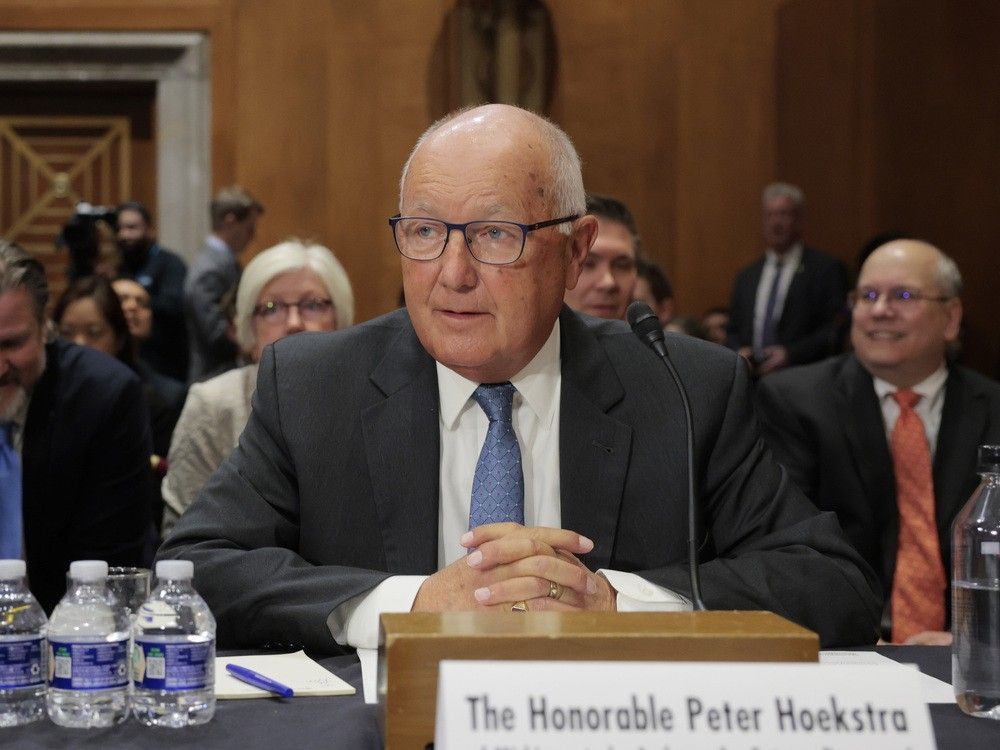The prospect of Canada becoming a state has been a topic of debate and speculation, especially in the context of recent Canada-US relations. U.S. Ambassador to Canada Pete Hoekstra remarked that President Trump has largely moved past this issue, suggesting it is no longer a focal point in discussions. Despite Trump’s occasional references to Canada as the “51st state,” Hoekstra emphasized that without proactive engagement from Canada’s Prime Minister, the idea remains unlikely. This sentiment was echoed during the recent meeting between Trump and Prime Minister Mark Carney, where both parties sought to mend relations that have been strained by tariffs and previous comments. Ultimately, while the notion of Canada becoming a state may resurface from time to time, current diplomatic efforts suggest a commitment to maintaining Canada’s sovereignty rather than pursuing statehood.
The conversation surrounding the possibility of Canada becoming part of the United States taps into broader sentiments of national identity and political dynamics. Current discussions about potential statehood have been influenced by various factors, including the latest remarks from key political figures and their implications on cross-border relations. Following the contentious period marked by U.S. tariffs on Canadian goods, the meeting between high-level officials signifies a turning point that could redefine the future of bilateral interactions. Consequently, whether addressing this issue under terms such as annexation or statehood, the dialogue continues to highlight an intricate relationship framed by both historical ties and contemporary challenges. As this debate unfolds, public sentiment and political stances on these matters will likely play a pivotal role in shaping the narrative.
The Controversy of Canada Becoming a State
The debate surrounding the notion of Canada becoming a state has been reignited multiple times, particularly during Donald Trump’s presidency. Despite U.S. Ambassador Pete Hoekstra’s recent statement claiming that this issue has been resolved, discussions continue to bubble beneath the surface. The idea of Canada as the “51st state” has invoked strong reactions from both American and Canadian citizens, particularly in the context of Canada-US relations. While Ambassador Hoekstra insists the topic is now behind us, President Trump’s repeated comments on the matter can complicate the diplomatic landscape.
Canadian leaders, including Prime Minister Mark Carney, have firmly rebutted any suggestions that Canada should be integrated into the United States. During their meetings, Carney emphasized that the notion of selling Canada is absurd, supporting the sentiment that Canadians pride themselves on their sovereignty. The comments made by Trump about the artificiality of the Canada-US border have been particularly controversial, igniting discussions surrounding national identity and independence.
Impact of US Tariffs on Canada-US Relations
US tariffs on Canadian aluminum and steel continue to be a sore point in the Canada-US relations, affecting not just diplomatic ties but also economic stability. These tariffs, which were intended as part of Trump’s broader campaign promises, have caused rifts among Canadian political and business leaders. They argue that ongoing tariffs create a toxic environment that fuels grievances and complicates trade negotiations. Despite this, Ambassador Hoekstra has attempted to reassure the public that the strong foundational ties between the two countries can withstand such pressures.
The persistence of tariffs has brought about a level of unpredictability for many Canadian industries reliant on cross-border trade. Vulnerable sectors argue that Trump’s approach to imposing tariffs contradicts the historical partnership and goodwill shared by the two nations. As Hoekstra acknowledged, while the issue of Canada becoming a state may be put to rest, economic issues still loom large, suggesting that the political narrative may evolve but the economic reality remains complex.
Reshaping the Canada-U.S. Relationship
The recent meeting between President Trump and Prime Minister Mark Carney has been viewed as a pivotal moment in reshaping the Canada-U.S. relationship. Ambassador Hoekstra remarked that the meeting fostered an environment for moving past contentious issues, offering a framework for more amicable interactions. The ability of both leaders to address these issues directly paves the way for stabilizing trade discussions and building a constructive dialogue moving forward. By acknowledging mutual respect and recognizing the strength of their friendship, Canada and the U.S. can work together more effectively.
Moreover, the careful handling of topics such as Canada becoming a state and U.S. tariffs reflects a diplomatic sensitivity crucial for maintaining strong ties. As Hoekstra puts it, the president understands that fruitful bilateral discussions require cooperation and common ground. This sentiment is critical, especially in contexts where national interests appear to diverge. The reset initiated by their conversations offers hope for ongoing collaboration, focusing on shared challenges and opportunities rather than past disagreements.
Public Sentiment on Canada Becoming a State
The public sentiment regarding Canada becoming a state remains largely negative among Canadians, reflecting a strong sense of national identity and independence. Polls have consistently shown that a vast majority of Canadians reject the idea of joining the United States as the 51st state. This reflects not only a desire to maintain sovereignty but also a cultural distinction that many Canadians hold dear. The concept of Canada as a state serves as a reminder of the potential erosion of their unique identity.
In contrast, some American perspectives, particularly from individuals close to Trump, might see the proposal as a playful banter rather than a serious initiative. Nevertheless, Canadian officials, including Prime Minister Carney, have been quick to clarify that there is no room for negotiation regarding their sovereignty. This dynamic illustrates a significant divide in public sentiment across the border, emphasizing the importance of recognizing and respecting national identities in diplomatic discussions.
The Role of Leadership in Canada-US Relations
Leadership plays an instrumental role in navigating the complexities of Canada-US relations, particularly in contexts marked by divisive comments or policies. The recent engagement between Trump and Carney signals a strategic effort from both leaders to recalibrate their diplomatic ties and focus on collaborative efforts rather than contentious debates. Hoekstra’s assertion that the issue of Canada becoming a state is behind them highlights the importance of leadership narratives in shaping public perception and policy discussions.
Through adept leadership, both Trump and Carney can work toward resolving existing issues like trade tariffs while fostering greater understanding between their citizens. The recognition of long-lasting friendships and partnerships—particularly from the American side—is essential in establishing a more productive dialogue that benefits both nations. By promoting cooperative initiatives and addressing grievances constructively, leadership can pave the way toward a prosperous and united North America.
The Future of Canada-US Economic Relations
Considering the current landscape of trade and diplomacy, the future of Canada-US economic relations appears to be navigable through continued dialogue and strategic policies that prioritize mutual benefits. The presence of tariffs remains a significant hurdle; however, ongoing discussions between political leaders suggest a willingness to find resolution. As Hoekstra noted, the foundation for strong relations already exists, indicating a potential for optimism as both countries strive to iron out economic tensions.
Looking ahead, Canada’s commitment to bilateral relations will play a crucial role in enhancing trade partnerships, especially in sectors hit hardest by tariffs. By focusing on cooperation, both nations can explore avenues for strengthening economic ties while addressing longstanding grievances. As conversations evolve, maintaining open lines of communication will be vital in ensuring that both countries can adapt to changing policies and public sentiments surrounding their diplomatic and economic futures.
Cultural Perspectives on National Identity
Cultural perspectives significantly influence how Canadians and Americans view the possibility of Canada becoming a state. For many Canadians, the notion of relinquishing sovereignty carries profound implications for their national identity. The pride in being Canadian is tied to unique cultural values, history, and social policies that distinguish them from their southern neighbor. These sentiments underscore the general reluctance toward the idea of joining the U.S. as the 51st state.
Conversely, there exists a segment of the American population that might view the integration of Canada as an opportunity for economic expansion and cultural enrichment. These differing cultural perspectives highlight the complexities involved in discussions about national sovereignty and identity. Engaging with these broad cultural narratives will be essential as both countries navigate their respective positions in a collaborative international landscape.
The Significance of Diplomatic Engagements
Diplomatic engagements between Canada and the U.S. have proven pivotal in addressing contentious issues and fostering collaboration. The recent meeting between Trump and Carney underscores the value of direct dialogue in easing tensions and promoting understanding. Such engagements are crucial, especially in times of friction, as they allow leaders to address concerns openly and constructively.
Moreover, these diplomatic interactions pave the way for future negotiations and partnership opportunities, ensuring that both nations can tackle shared challenges together. As longstanding allies, the importance of maintaining open and effective communication cannot be overstated. Investing in diplomatic relationships is essential for framing future discussions around trade, security, and cultural exchange, ultimately striving for a harmonious relationship between the two neighbors.
Understanding Political Commitments and Their Impact
Political commitments, such as those related to tariffs or trade agreements, have a profound impact on Canada-US relations. Trump’s insistence on tariffs has sparked significant controversy and backlash, but it also represents a commitment to a broader agenda that he believes supports American interests. Understanding the intricacies of these commitments is essential for Canadian leaders as they strategize their responses and negotiate their national interests.
Ambassador Hoekstra’s statements reflect a belief that political landscapes can change, but strong relationships endure. While professional and personal ties historically bind the nations, political commitments can create turbulence at times. Navigating these complexities requires diplomatic finesse to ensure both sides can rebound from disputes while remaining focused on shared interests in their ongoing collaboration.
Frequently Asked Questions
What is the current status of the Canada becoming a state debate?
The debate over Canada becoming a state has been largely put to rest, according to U.S. Ambassador Pete Hoekstra. He stated that President Trump recognizes the issue is not feasible without engagement from the Canadian Prime Minister. After recent discussions, it appears that both nations are moving forward rather than focusing on this contentious topic.
How do U.S. tariffs on Canada affect the discussion of Canada becoming a state?
U.S. tariffs on Canadian steel and aluminum contribute to a complex relationship between the two countries, but they are not directly tied to the debate of Canada becoming a state. Ambassador Hoekstra noted that while issues like tariffs create friction, they do not serve as barriers to discuss other matters in Canada-US relations.
Why has President Trump suggested Canada might become the 51st state?
President Trump has occasionally referred to Canada as the ’51st state’ in a light-hearted manner, but these comments are not serious proposals. During meetings with Canadian officials, he has acknowledged that discussions about Canada becoming a state are not a priority, signaling a move away from this narrative.
What did Prime Minister Mark Carney say in response to the Canada becoming a state comments?
Prime Minister Mark Carney firmly stated that some places are ‘never for sale,’ emphasizing Canadian sovereignty and ownership over their land. His comments reflect a strong national sentiment against the idea of Canada becoming a U.S. state.
What impact do personal relationships have on Canada-US relations regarding the state debate?
Ambassador Hoekstra emphasized that the personal relationships between leaders of Canada and the U.S. have historically bonded the two nations despite any disagreements. This strong foundation is crucial in maintaining a positive rapport, moving beyond discussions of Canada becoming a state.
Have recent meetings between Canadian and U.S. leaders changed the Canada 51st state debate?
Yes, recent meetings, particularly between President Trump and Prime Minister Carney, have clarified that the debate over Canada becoming a state is not on the agenda. Hoekstra indicated that this topic is essentially resolved, allowing both countries to focus on other pressing issues in their relationship.
What does the future hold for Canada US relations amid the statehood discussions?
The future of Canada US relations seems focused on cooperation and addressing challenges like tariffs rather than on the controversial topic of Canada becoming a state. With key leaders prioritizing constructive dialogue, it’s likely that both nations will work towards strengthening their partnership without dwelling on the statehood discussions.
| Key Points | Details |
|---|---|
| U.S. Ambassador’s Statement | Ambassador Pete Hoekstra says the issue of Canada becoming a state is behind them. |
| Trump’s Comments | Trump has made remarks about Canada being the ’51st state’, but it is not a serious agenda item anymore. |
| Meeting Outcomes | The recent meeting between Trump and Prime Minister Carney is viewed as a moment to mend U.S.-Canada relations. |
| Carney’s Response | Carney stated that Canada is not for sale and emphasized the ownership Canadians feel towards their country. |
| Ongoing Issues | Despite the diplomatic efforts, U.S. tariffs on Canadian steel and aluminum continue to strain economic relations. |
| Friendship Between Nations | Hoekstra insists that the longstanding friendship between the U.S. and Canada cannot be changed. |
Summary
Canada becoming a state has been a topic often brought up by U.S. President Donald Trump but is no longer a significant discussion point, according to U.S. Ambassador to Canada Pete Hoekstra. Recent dialogues indicate a willingness from both nations to move past this idea and focus on strengthening their economic and diplomatic ties. Despite ongoing challenges such as tariffs on Canadian goods, the personal relationships between leaders from both countries remain a foundational element of their interactions. Canada continues to assert its sovereignty firmly, with Prime Minister Carney’s statements reinforcing that Canada is not up for negotiation.



